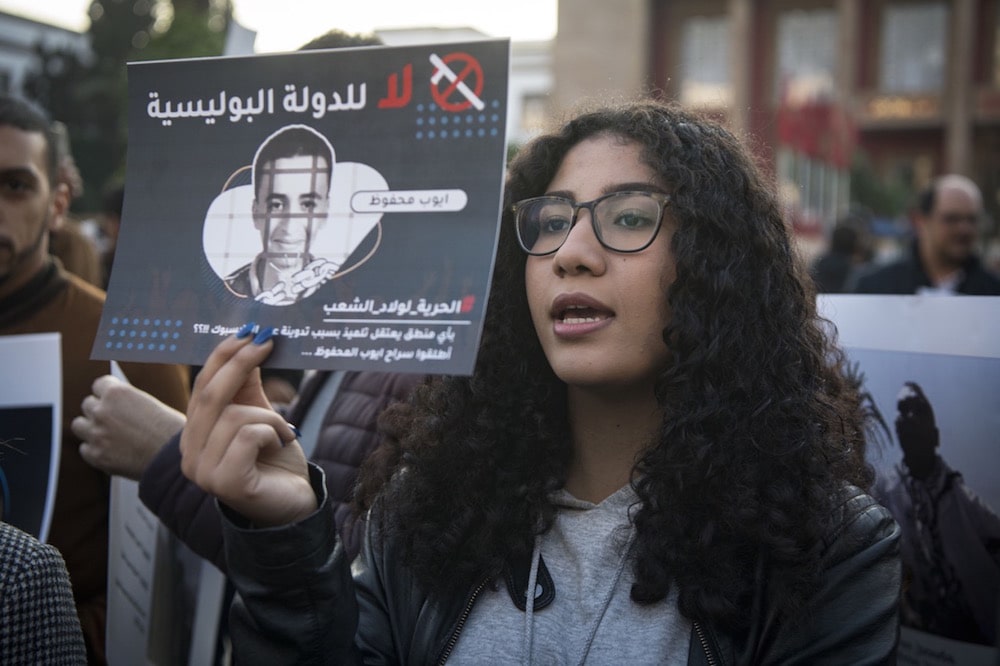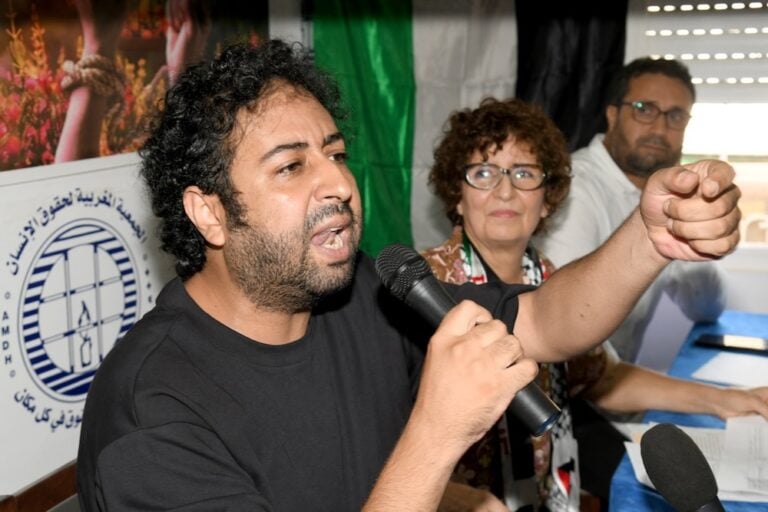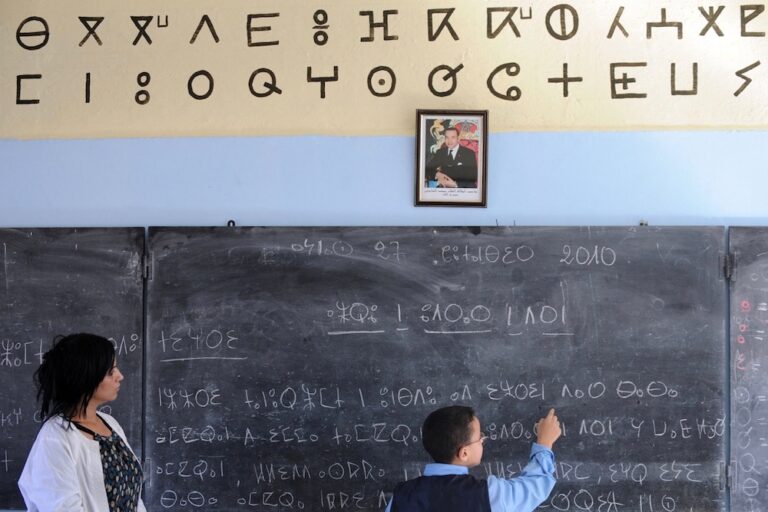New bill aims to enforce stringent regulations on social media users, including punitive measures that curtail individual freedoms.
This statement was originally published on smex.org on 3 July 2023.
In January 2023, Moroccan Minister of Justice, Abdellatif Wehbe, announced introducing stricter penalties in the new criminal law draft to punish individuals spreading fake news on social media.
At the time, Minister Wehbe advocated for applying criminal law to all content published on social networks in case of legal disputes rather than relying solely on press and publications laws, which do not involve imprisonment. He referenced a recent court ruling by the Court of Cassation supporting this approach.
Muhammad Zayan, the head of the Bar Association and former Minister of Human Rights, currently imprisoned based on a politically motivated trial, has deemed this “a violation of the constitution and the law,” as he told SMEX.
Minister Wehbe’s statement follows the previous government’s failure to enforce Law No. 22.20 concerning “the use of social media platforms, public broadcasting networks, or comparable networks.” This law faced strong resistance from social media users and human rights organizations, leading to its withdrawal.
A Muzzling Law
On March 19, 2020, while Moroccans were preoccupied with the COVID-19 pandemic, the Council of Government approved the draft law No. 22.20. The bill aimed to enforce stringent regulations on social media users, including punitive measures that curtail individual freedoms.
Article 14 of the proposed legislation specifically mandated penalties ranging from six months to three years of imprisonment, accompanied by fines between 5,000 dirhams (approximately $500) and 50,000 dirhams (approximately $5,000), or one of these penalties.
They targeted individuals who intentionally advocated for boycotting specific products or services on social media platforms, public broadcasting networks, or similar mediums or those who publicly solicited others to participate in such boycotts.
Ironically, Article 14 was introduced less than two years after the initiation of a prominent boycott campaign against three major companies operating in the fuel, milk, and water sectors in response to exorbitant prices. The “We Are All Boycotting” campaign took off on Facebook in 2018 and gained momentum on Twitter and YouTube.
The targeted companies suffered significant financial losses due to this movement, which criticized the intertwining of wealth and politics. Of particular focus was the Afriquia Petrol Stations, owned by the current prime minister, Aziz Akhannouch, known for his close ties to the royal palace and infamous for his statement that “Moroccans must be re-educated.”
Furthermore, Article 16 of the draft law addresses disseminating or promoting false news through social media networks, open broadcast networks, or similar platforms. It states that individuals engaging in such activities shall face imprisonment ranging from three months to two years and fines ranging from one thousand to five thousand dirhams (approximately $100 to $500).
However, the Article fails to provide an accurate definition of “false news,” which raises concerns that authorities may exploit it to silence journalists and human rights defenders who criticize those in power. Article 19 and MENA Rights Group have highlighted this issue in their report.
Amnesty International believes the Moroccan authorities have abused the COVID-19 pandemic to curtail freedoms and impose restrictions on cyberspace by introducing such a draconian law. In doing so, Morocco has followed in the footsteps of Algeria, which implemented amendments to its Penal Code in April 2020, targeting “false news” that could potentially harm “public order.”
Violations of this provision in Algeria carry penalties of up to three years imprisonment and fines reaching 300,000 Algerian dinars (around $2,322). In 2013, the Moroccan government attempted to pass the “digital law” which threatened freedom of opinion and expression. However, it ultimately withdrew the legislation due to widespread public opposition.
Immunizing the Ministry of the Interior against Criticism
In December 2022, Interior Minister Abdelouafi Laftit warned that social media users should not tarnish the reputation of governors, employees, and structures within the ministry.
He emphasized that anyone found guilty of such actions would face legal consequences. Laftit argued that the criticism directed towards senior officials within the Ministry of Interior aimed to “undermine the important work carried out by the country’s constitutional institutions.”
This speech took place against an increasing crackdown on bloggers in Morocco. In November 2022, authorities arrested former Minister of Human Rights Muhammad Zayan, who was 80 years old at the time, at his lawyer’s office in the capital city of Rabat. Zayan had been sentenced to three years in prison based on a lawsuit filed against him by the Ministry of the Interior. He was known for his critical stance towards the security services and the royal palace, which he expressed through platforms like YouTube and Facebook.
Similarly, in January 2023, Moroccan security forces arrested blogger Yassin Benchekroun on charges of “insulting legally organized and other constitutional institutions and disrespecting judicial decisions.”
These charges were related to critical posts he published on his Facebook account, targeting the king and the security services. Benchekroun was sentenced to two years in prison and fined 50,000 dirhams (approximately $5,000).
In February 2023, the Rabat Court of Appeal convicted activist Rida Benotmane, known for advocating for digital rights, to prison for a year and a half. His conviction was based on posts he published on Facebook and videos he uploaded on YouTube in 2021, in which he criticized the authorities.
Taxing YouTube Content Creators
As announced by Mustapha Baitas, the official government spokesperson, the Moroccan government expressed its intention in May of last year to impose taxes on YouTube channel owners. Baitas stated that “any income-generating activity should contribute to the state treasury.”
This decision has implications for activists and journalists who rely on YouTube to fund their media projects. Independent newspapers and websites face financial constraints due to limited advertising and a lack of public support. Moroccan authorities, in conjunction with the judiciary, exploit these economic pressures by blocking advertising and suffocating financial resources to suppress independent journalism, as highlighted by Aboubakr Jamai, a journalist and director of the International Relations Program at the American University Institute in Aix-en-Provence.
Consequently, some journalists have turned to YouTube to self-finance their media projects, including Hamid El Mahdaoui, who relies on the profits from his YouTube channel to finance the “Badil” news site, one of the prominent independent journalistic outlets in the country.
As of January, statistics indicate that the number of internet users in Morocco reached 33.18 million. Among these users, approximately 17.30 million are active on Facebook, while 21.30 million use YouTube.
The government’s recent approach coincides with the ongoing debate regarding the amended criminal law articles related to regulating social media networks. Despite the Minister of Justice’s announcement in January 2023 that these articles would be published during the next month, the government has been hesitant to release the texts.
This delay may result from concerns over potential protests that could erupt due to the issuance of legal provisions that restrict freedom of expression online and foster self-censorship among citizens. It is worth noting that previous governments faced obstacles in passing the “digital law” bill in 2013, following the successful “#electronic_disobedience” campaign that prevented its enactment. The subsequent Bill No. 22.20 faced similar challenges in 2020.



